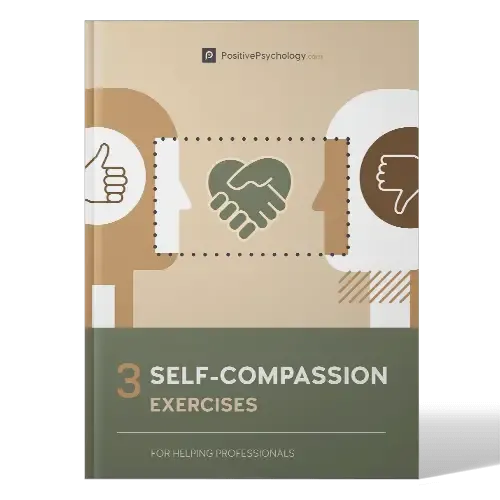Building Strong Self-Belief: 16 Tips & Activities

“Whether you think you can or whether you think you can’t, you’re right.”
Henry Ford
This classic quote from automobile magnate Henry Ford is a perfect lead into this piece. The topic is self-confidence and self-belief, two ingredients to a healthy and happy life.
According to Ford, your belief in yourself is a determining factor in your success.
Was he right? Read on to find out!
Before you read on, we thought you might like to download our three Self-Compassion Exercises for free. These detailed, science-based exercises will not only help you increase the compassion and kindness you show yourself but will also give you the tools to help your clients, students or employees show more compassion to themselves.
This Article Contains:
- What is the Meaning of Self-Confidence and Self-Belief?
- The Psychology of Self-Confidence and Self-Belief
- 3 Examples of Healthy Self-Belief
- 12 Tips for Building Self-Confident Skills
- Activities and Exercises for Developing Self-Confidence
- Hypnosis and Hypnotherapy
- Guided Meditations to Boost Self-Confidence
- Motivational Speeches and Popular TED Talks and Videos
- 19 Quotes and Affirmations on Self-Confidence
- A Take-Home Message
- References
What is the Meaning of Self-Confidence and Self-Belief?
Researchers have a tough time agreeing on what, exactly, self-confidence is. Some say it is simply believing in yourself, while others go into more detail about your expectations for and evaluations of yourself and your performance.
For non-academic purposes, however, we have a pretty solid definition; this definition comes from the Psychology Dictionary Online:
“Our self-assurance in trusting our abilities, capacities, and judgments; the belief that we can meet the demands of a task.”
This definition works pretty well for the average person and is easy to understand. To be self-confident is to trust in your own abilities and believe that you can do what you set your mind to.
As you can see from the definition, self-belief is a necessary—but not sufficient—component of self-confidence. You must have at least some self-belief to have self-confidence, but self-belief does not guarantee you self-confidence.
Along with characterizing your beliefs about yourself, self-confidence is a trait that permeates your thoughts, feelings, and actions. Think about a confident person you know; now, think about how you know this person is confident. You cannot get inside their head to know how they feel about themselves, so you base your judgment of their self-confidence on their words and actions.
To be truly self-confident is to exude confidence in your words and actions, in addition to believing in yourself and feeling capable.
The Psychology of Self-Confidence and Self-Belief

Thanks to William James, we learned that self-confidence is an important predictor of success. His formula for self-esteem (a related, but slightly different, construct than self-confidence) proposes that it is built on the foundations of two elements (Nayler, 2010):
- How we feel and what we believe about ourselves (our self-confidence/self-belief)
- How well we actually perform (our successes)
This concept was not a new one, but James was one of the first to lay it out in detail. The idea stuck and influenced the work of another important theory in the area of self-confidence and self-esteem: Bandura’s Self-Efficacy Theory.
Bandura’s theory states that self-efficacy is built on one’s beliefs in the likelihood of future success; those who believe they can influence the events of their lives have high self-efficacy, while those who feel they are not in control and have little to no impact on what will happen to them in the future, have low self-efficacy (Bandura, 1977).
Self-efficacy is focused on current beliefs about the future; while self-confidence is also concerned with beliefs about the future, there is a definite link to the past—after all, our self-confidence is built on our past experiences.
Deci and Ryan drew from Bandura’s work to create their own theory on another “self-” construct: self-esteem. Self-Determination Theory posits that we are all born with an inherent drive to explore our environment and thrive, and that self-esteem results from humanity’s basic needs being met:
- Relatedness
- Competence
- Autonomy (Ryan & Deci, 2000)
This theory expanded the boundaries of the self-confidence/self-esteem literature by adding in the needs component; when our needs are met, according to the theory, we have all the ingredients necessary to experience healthy self-esteem and to grow and flourish as a person.
Based on these three theories, and countless other reports, articles, and studies by other researchers in the field, we have been able to put together a more coherent picture of what self-confidence is. It is a sense of belief in oneself and feeling assured of your own abilities and chances of future success, and it is in large part based on your experiences.
We explore this further in The Science of Self-Acceptance Masterclass©.
Self-Confidence vs. Self-Esteem
So, although self-confidence and self-esteem have crossed paths at many points and share some common features, they are considered two distinct constructs.
Self-esteem is a fairly stable trait that doesn’t change much in individuals—unless they put in some dedicated effort to improve it. It can generally be defined as our beliefs in our own inherent value, worth, and how deserving we are of love, happiness, success, and other good things in life.
By contrast, self-confidence does not take into consideration any beliefs about worthiness or overall value; rather, it focuses on the ability to succeed and beliefs about one’s likelihood of succeeding.
The two are certainly related, but it is easy to see where the line is drawn between them; self-esteem is about the success you feel you deserve, while self-confidence is about the success you feel you are capable of achieving.
3 Examples of Healthy Self-Belief
Healthy self-belief is not narcissism, bragging, or boasting. Rather, it is a realistic but optimistic evaluation of yourself and your abilities and a sense of trust and confidence in yourself.
Examples of healthy self-belief and self-confidence include:
- A woman goes on a date and has a great time; she feels like she and her date clicked and is looking forward to hearing from him. When he doesn’t call within a few days, she refrains from falling into a negative thought spiral and instead thinks, “Maybe he just isn’t the type of guy who calls right away. Or, maybe we just aren’t right for each other. I had fun and that’s what matters!”
- A man is looking for a job and sees a posting that has several requirements; he meets most of them, but he doesn’t quite reach the cutoff on a couple of them. Instead of passing it up and assuming he would never get an interview, he applies anyway and explains how he has other traits and qualifications that make up for any lack in the requirements in his cover letter.
- A student is interested in taking an Advanced Placement class at her high school and talks to her friends about it. Those who have already taken the class tells her it’s really hard and that she probably wouldn’t pass. She could trust in their judgment and pass up the opportunity, but instead, she holds firm in her belief about her own abilities and signs up anyway.
12 Tips for Building Self-Confident Skills
So, how do you become one of those people described above?
It isn’t necessarily an easy road, but you will probably find it more than worth the effort. Below are some tips on building your self-confidence and boosting your belief in yourself.
The team from the Mind Tools (2016) website listed several tips and suggestions for improving your self-confidence based on where you are on your journey:
- Preparing for your journey
a. Take inventory of what you have already achieved.
b. Think about your strengths and weaknesses (but especially your strengths).
c. Think about your goals and values.
d. Practice ceasing negative self-talk in its tracks and replacing it with positive thinking.
e. Commit to the journey to self-confidence! - Setting out
a. Identify and enhance the knowledge and skills you need to succeed.
b. Focus on the basics—don’t get bogged down in details or reaching for perfection.
c. Set small goals and achieve them to “pile up successes.”
d. Keep working on your positive thinking and self-talk. - Accelerating towards success
a. Celebrate your successes.
b. Keep yourself grounded.
c. Assess your current level of self-confidence and identify what strategies you can use to keep building it up.
If you hit a roadblock on your journey to self-confidence, don’t worry! They happen to everyone. Try to get back on track as soon as you can. You may find the following activities helpful.
Activities and Exercises for Developing Self-Confidence
Here are activities and exercises you can do to work on your self-confidence and self-esteem.
Of course, the most important thing you can do to build your self-confidence is to get some success experiences under your belt—no matter how small—but here are some other things you can try as well.
Recognizing negative thoughts
Negative thoughts are so often a drain on our self-confidence, and we may not even realize it. Negative thoughts can be sneaky, so we need to be extra-vigilant in identifying and addressing them.
Practice “listening” to your own thoughts; notice the automatic thoughts that pop into your head and pay attention to the way you talk to yourself. When you notice a negative thought, grab onto it and either write it down or just sit and think about it for a moment.
Don’t spend long thinking about the thought in its current form, though. Instead, spend your time thinking about how it can be rephrased and adapted to become a positive (or at least neutral) thought.
For example, if you catch yourself thinking, “You’re such a failure! You can’t do anything right!” try to replace it with a more forgiving phrase like, “Everyone makes mistakes sometimes. I bet I can do better next time!”
This replacement thought not only offers you forgiveness and compassion, it also helps you boost your belief in your ability to succeed in the future. Give it a try and see if it works for you!
Challenging yourself
The best way to boost your self-confidence is to open yourself up to positive new experiences and allow yourself to succeed.
If you have low self-confidence, you probably don’t like taking risks—whether those risks involve physical activity, going for a new job or promotion, talking to someone you like, or just trying a new activity. It is a classic catch-22: your low self-confidence encourages you to avoid doing the exact things that would help you build up your self-confidence.
If uninterrupted, this can lead to an ever-deepening spiral of low self-confidence; you don’t have any exciting new successes, so your self-confidence is even lower, so you feel even less like trying new things.
To break this cycle, you know what you need to do: put yourself out there, try something new, and challenge yourself!
Find one thing you are interested in and go for it. It might be a cooking class, a running group, marathon training, or volunteering for a cause you are passionate about. Whatever it is, push yourself to take a risk and watch your confidence grow.
Giving yourself the self-care you need
Self-care is incredibly important for a lot of things, but it can be especially impactful for our self-confidence.
Engage in self-care to show yourself how valuable you are, and you will feel more confident in your abilities and motivated to prove that you are right about yourself.
Remember that self-care is about much more than just getting a massage or allowing yourself to indulge in some extra-tasty food or on a Netflix binge. Make sure to take care of your body, mind, and soul by eating healthy, exercising, giving yourself a break, and engaging in whatever other self-care you need to feel good.
Practice accepting failure
This isn’t an especially fun exercise to practice, but it is a necessary one. We all fail at some point, and it does us absolutely no good to pretend that we don’t—or won’t—ever fail.
To practice accepting failure, engage in some activities that you know you will fail at. I know, it sounds terrible! Why would you do something when you know you will fail? Because practicing failure can be just as important as practicing success.
Take risks and set stretch goals for yourself. Sometimes you will achieve them, and sometimes you won’t. Whether you achieve them or not, make sure to tell yourself the same thing after: “You put a lot of effort into this and I’m proud of you for working hard.”
You don’t need to succeed to be proud of yourself and confident in your abilities (Coleman, 2017).
Hypnosis and Hypnotherapy
You have certainly heard of hypnosis before, but you may not be as familiar with hypnotherapy—and you may not know what that has to do with self-confidence.
Hypnosis is an alternative treatment that is generally not practiced as a first-line approach, but it is not uncommon for a therapist to use hypnosis in cases that call for it. A lack of self-confidence can be one such case.
While CBT and other behavioral therapies can do a great job of tackling your conscious thoughts and helping you manage your feelings and behavior, we know that there is also a lot going on in your subconscious. Hypnotherapists believe that hypnosis can help treat low self-confidence by breaking into the negative things happening in your subconscious and injecting a dose of positivity.
If you’re interested in giving it a try, check out this sleep hypnosis on YouTube.
If you’re interested in trying hypnotherapy with a qualified professional, you can learn more here.
Guided Meditations to Boost Self-Confidence
If you’re a fan of meditation and would like to try some that are geared toward improving your self-confidence, these might be just what you’re looking for:
Guided Meditation: Self-Esteem from The Honest Guys
Guided Meditation for Confidence, Self Love, and a Better Self Image from Joe T at Hypnotic Labs
Healing Spirit: Guided Meditation for Self Esteem and Acceptance, Anxiety, and Depression from MeditationRelaxClub
Motivational Speeches and Popular TED Talks and Videos
If you’re ready to get pumped full of confidence and motivation, but you don’t have time to watch a whole feature-length movie, check out these TED Talks and inspirational speeches:
The Skill of Self Confidence by Dr. Ivan Joseph
Success and Self-Confidence Through Rejection by Ted Ladd
The Surprising Secret to Speaking with Confidence by Caroline Goyder
The Power of Believing You Can Improve by Carol Dweck
19 Quotes and Affirmations on Self-Confidence
If you’re looking for some inspirational self belief quotes or motivating affirmations to help you boost your self-confidence, check out this list of 19 quotes and affirmations.
“A great figure or physique is nice, but it’s self-confidence that makes someone really sexy.”
Vivica A. Fox
“One important key to success is self-confidence. An important key to self-confidence is preparation.”
Arthur Ashe
“Nothing builds self-esteem and self-confidence like accomplishment.”
Thomas Carlyle
“To excel at the highest level—or any level, really—you need to believe in yourself, and hands down, one of the biggest contributors to my self-confidence has been private coaching.”
Stephen Curry
“With realization of one’s own potential and self-confidence in one’s ability, one can build a better world.”
Dalai Lama
“Self-confidence is the first requisite to great undertakings.”
Samuel Johnson
“Smile, for everyone lacks self-confidence and more than any other one thing a smile reassures them.”
Andee Maurios
“The way to develop self-confidence is to do the thing you fear and get a record of successful experiences behind you.”
William Jennings Bryan
“My self-confidence didn’t come from my appearance, it came from other things that I did. But certainly not my appearance.”
Alex Spanos
“I’ve studies the lives of the 20th century’s great businessmen and concluded that self-confidence was instrumental in all their success.”
Ron Perlman
“Once we believe in ourselves, we can risk curiosity, wonder, spontaneous delight, or any experience that reveals the human spirit.”
E.E. Cummings
“Because one believes in oneself, one doesn’t try to convince others. Because one is content with oneself, one doesn’t need others’ approval. Because one accepts oneself, the whole world accepts him or her.”
Lao Tzu
If these quotes don’t quite hit the spot, you may benefit from creating some self-confidence affirmations. You can also create your own, but these are some good examples that can help get you started:
- “I am smart, competent, and capable.”
- “I am growing and changing for the better.”
- “I believe in myself and my abilities.”
- “I can do anything I set my mind to.”
- “I act with confidence and with a plan, but I accept that plans can change.”
- “It is enough to have done my best.”
- “I have the power to change myself.”
A Take-Home Message
I hope you found this piece a useful and informative dive into self-confidence and self-belief. It turns out that Henry Ford was mostly right—although self-confidence isn’t necessary to function in our world, it can make all the difference between “just getting by” and thriving!
If you found any of these exercises useful, bookmark this page so you can come back to it at any time and remind yourself that you can do it—whatever it is!
What are your thoughts on this topic? Do you think self-confidence is the key to success? How do you give yourself a boost of confidence when you need it? Let us know in the comments section!
We hope you enjoyed reading this article. Don’t forget to download our three Self Compassion Exercises for free.
- Bandura, A. (1977). Self-efficacy: Toward a unifying theory of behavioral change. Psychological Review, 84, 191-215.
- Coleman, C. (2017). Activities to build self-confidence. Live Strong. Retrieved from https://www.livestrong.com/article/17120-activities-build-self-confidence/
- Mind Tools Content Team. (2016). Building self-confidence: Preparing yourself for success! Mind Tools. Retrieved from https://www.mindtools.com/selfconf.html
- Mowday, R. T. (1979). Leader characteristics, self-confidence, and methods of upward influence in organizational decision situations. Academy of Management Journal, 22.
- Nayler, C. (2010). What is self-esteem? 3 theories on the function of self-esteem. Positive Psychology.org.uk. Retrieved from http://positivepsychology.org.uk/self-esteem-theory/
- Ryan, R. M., & Deci, E. L. (2000). Self-determination theory and the facilitation of intrinsic motivation, social development, and well-being. American Psychologist, 55, 68-78.
Let us know your thoughts
Read other articles by their category
- Body & Brain (42)
- Coaching & Application (54)
- Compassion (26)
- Counseling (50)
- Emotional Intelligence (24)
- Gratitude (18)
- Grief & Bereavement (21)
- Happiness & SWB (39)
- Meaning & Values (25)
- Meditation (20)
- Mindfulness (44)
- Motivation & Goals (43)
- Optimism & Mindset (32)
- Positive CBT (25)
- Positive Communication (20)
- Positive Education (44)
- Positive Emotions (30)
- Positive Leadership (13)
- Positive Psychology (32)
- Positive Workplace (33)
- Productivity (16)
- Relationships (41)
- Resilience & Coping (34)
- Self Awareness (20)
- Self Esteem (36)
- Software & Apps (13)
- Strengths & Virtues (30)
- Stress & Burnout Prevention (33)
- Theory & Books (44)
- Therapy Exercises (35)
- Types of Therapy (58)







What our readers think
It was a good experience to read this article.
GREAT content, however the free download link leads to a buy page for 17 excerciese tool book, that is a bit of a shoddy move, you should not promise anything free if you are not delivering it
Hi Poorva,
We apologize if there was any confusion!
Are you referring to the 3 free self-compassion exercises? You can access the free exercises here.
Please let us know if you continue to encounter issues with accessing the material.
Kind regards,
Julia | Community Manager